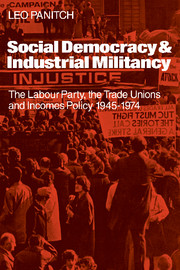 Social Democracy and Industrial Militiancy
Social Democracy and Industrial Militiancy Book contents
- Frontmatter
- Contents
- Preface
- List of Abbreviations
- Introduction
- 1 The 1945 Labour Government: the mixed economy and wage restraint
- 2 Incomes policy and Labour in opposition
- 3 The voluntary incomes policy agreement
- 4 The devaluation of voluntarism
- 5 The politics of wage freeze
- 6 The statutory incomes policy – Labour Government versus labour movement
- 7 ‘In place of strife’
- 8 Industrial militancy and political stagnation
- Conclusion
- Appendixes
- Notes
- Index
- Frontmatter
- Contents
- Preface
- List of Abbreviations
- Introduction
- 1 The 1945 Labour Government: the mixed economy and wage restraint
- 2 Incomes policy and Labour in opposition
- 3 The voluntary incomes policy agreement
- 4 The devaluation of voluntarism
- 5 The politics of wage freeze
- 6 The statutory incomes policy – Labour Government versus labour movement
- 7 ‘In place of strife’
- 8 Industrial militancy and political stagnation
- Conclusion
- Appendixes
- Notes
- Index
Summary
Itself a product of the class divisions of capitalist society, the British Labour Party has relied on the support of the working class for its political success. Electorally and organizationally, it was nurtured and has been sustained through its structural ties with the trade union movement from which it derives the vast proportion of its membership and finances. Ideologically, however, the Party has never been exclusively or even primarily a working class party. Ever since its founding conference threw out a motion calling for ‘a distinct party … based upon the recognition of the class war’, the Party has presented itself as a national party cast in the historical role of integrating the interests and demands of the working class with those of the British nation as a whole. In this respect, the Party has fitted the mould of what contemporary political sociologists call an integrative political party, fulfilling systemic functions like representation and brokerage, demand conversion and aggregation, imbued with a conception of the social order as being basically unified rather than fissured, and effecting a compromise between the sectional interests of various classes in the society by means of policies ‘in the national interest’. This integrative cornerstone of the Labour Party's ideology has shaped its particular socialist orientation, which has been defined not in terms of the conquest of power by the working class, but as the culmination of the development of the whole nation, the product of social harmony and class cooperation.
- Type
- Chapter
- Information
- Social Democracy and Industrial MilitiancyThe Labour Party, the Trade Unions and Incomes Policy, 1945–1947, pp. 1 - 6Publisher: Cambridge University PressPrint publication year: 1976
- 1
- Cited by


